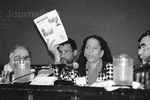1998 Batten Symposium Panel Presentation:
Framing the Story in New Ways
Wrightwood: A Neighborhood In Transition Wrestles with Change
 Laura Washington
Laura Washington
Editor and Publisher
The Chicago Reporter
One of the things that we learned from civic journalism is, this is no picnic. It’s a lot of hard work. We are experts at hard work. We spend three to four months at a time on any one of our stories. But this story was like nothing we had ever undertaken before.
One frame we used was a community meeting… We learned a lot just by the dynamics of the meeting… Everyone walks in the room and all the blacks sit on one side and all the whites sit on the other side. The whites tend to be much older, retirees. The blacks tended to be younger people, people who look like they would still have children at home, working professionals for the most part.
Just that alone told us a lot that we could have learned after talking to 20 or 30 people by phone, but in a different kind of context.
After the meeting, we had staff there to buttonhole people… Many of the whiles had the perception that the neighborhood was 70 or 80 percent black. Blacks privately would tell you they thought it was about half and half black.
. . . Blacks seemed to think that the property values in the neighborhood were going up, in fact were maybe even inflated because of the racial change. Whites thought that their property values were deflated… More whites had the perception that there was growing crime in the neighborhood. Blacks didn’t feel that way. Those things told us about the disconnects and also told us about where we needed to look.
By writing a story about Wrightwood, by giving some of these specifics, I think we provided a service to the community, shedding some light, correcting some misimpressions, changing some minds. And that, to me, is a service in itself. But it’s a two-way street.
When you go into a community and you have meetings and you spend far more time then you’ve ever seen media spend, you set up high expectations. We realized at the first meeting that people were going to expect the world from us. They were going to expect us to write down every single word they said and publish it verbatim. And there is just no way you can meet those expectations… You’re going to make some people mad in the process, and that’s one of the reasons why the story was so difficult to report because we had to take all the perceptions, we had to check them all out, then we had to explain to our sources why we were weren’t going to publish what they said because it simply wasn’t true.